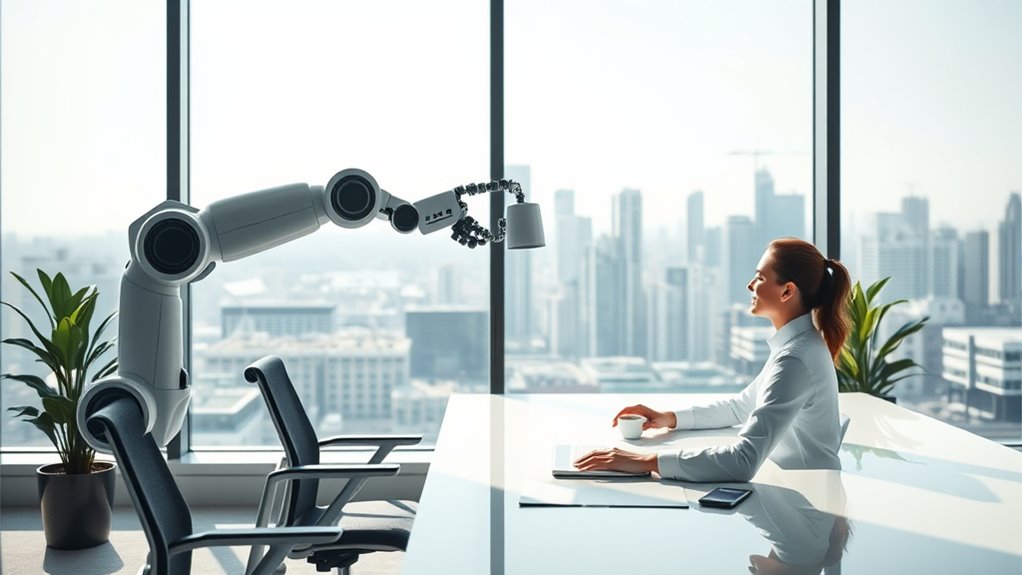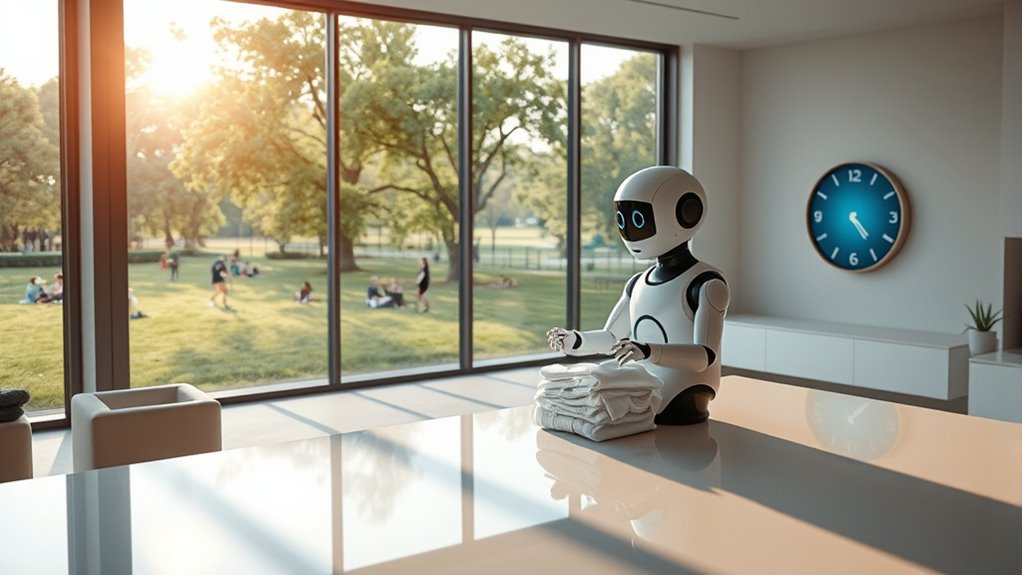Automation promises more leisure time, but in reality, it often leads to longer work hours and higher expectations. Many companies use automation to boost productivity but push employees to work more, not less. Instead of freeing up your schedule, you might find yourself working extended hours or taking on extra tasks. If you want to discover how automation is truly reshaping your free time and work life, there’s more to explore.
Key Takeaways
- Automation increases efficiency but often leads to longer work hours due to rising employer expectations and competitive pressures.
- Many industries see productivity gains as a reason to extend workdays, not reduce them, limiting leisure time.
- Longer hours and work-related stress diminish the potential leisure benefits automation could provide.
- Actual leisure time depends heavily on organizational culture, market demand, and incentive structures rather than automation itself.
- Without deliberate policies promoting work-life balance, automation alone is unlikely to translate into more leisure time.
The Impact of Automation on Work Hours and Productivity

Automation is transforming how we work by increasing productivity and changing work hours. Nearly half of today’s tasks could be automated with current technology, boosting efficiency across industries. Automated systems handle repetitive tasks faster, freeing you to focus on creative and strategic activities. Most knowledge workers—about 90%—say automation has greatly improved their work lives, saving around 240 hours annually. This shift leads to more streamlined operations, lower costs, and higher satisfaction for employees and customers alike. Additionally, halal lifestyles are increasingly integrating automation to ensure ethical and balanced living, aligning modern trends with cultural values. The role of contrast ratio in projectors also impacts how we experience visual content, making automation in display technology increasingly important. Moreover, research in sound healing science suggests that integrating sound therapy into work environments could further enhance well-being and productivity. As automation becomes more prevalent, job displacement concerns highlight the need for workers to develop new skills to adapt to the evolving landscape. However, concerns about job displacement remain, with over a third of workers worried about losing their jobs to automation. By reallocating hours from routine tasks, automation offers the chance to focus on higher-value work, though it also demands adaptation and skill development to navigate these changes effectively. Additionally, understanding the potential for increased leisure time can help policymakers and organizations plan for a future where automation benefits everyone.
How AI Is Changing Leisure Activities and Social Interaction

AI is transforming how you enjoy leisure activities and connect with others by personalizing experiences and fostering creativity. It tailors hobbies to your preferences, making activities like art, music, and sports more engaging. AI-driven creative assistants help you generate unique content, boosting your creative expression. Personalized AI coaching adapts your exercise routines to your goals, improving performance. Additionally, AI facilitates community building through platforms that connect people with shared interests, enabling virtual and hybrid social interactions. These advancements also support the development of spiritual energy within communities, fostering a sense of connection and collective growth. Incorporating predictive modeling in educational data mining can further enhance personalized experiences by understanding user preferences and behaviors more deeply. As AI continues to evolve, it encourages ethical considerations to ensure that technology benefits society as a whole. Moreover, advancements in user engagement techniques help maintain motivation and sustained participation in leisure activities. Recognizing the importance of technological knowledge in designing engaging AI systems can further optimize these leisure experiences and ensure equitable access for diverse populations.
The Economic Forces Driving Longer Workdays Despite Gains in Efficiency

Even though automation boosts productivity, many companies push for longer workdays to stay competitive and cover rising costs. You might work more hours because economic incentives prioritize growth over leisure. As a result, efficiency gains often lead to increased workloads instead of shorter hours. According to McKinsey, AI could influence half of the global economy, affecting 1.2 billion employees and $14.6 trillion in wages. Additionally, the trend toward energy-efficient appliances reflects the broader focus on optimizing resource use, yet it often coincides with increased operational demands. This paradox highlights how productivity gains are sometimes redirected to meet expanding business needs rather than providing more free time. Recognizing the impact of organizational culture can help organizations develop strategies that truly prioritize work-life balance and foster creative practice to find innovative ways to balance productivity with leisure. Moreover, understanding the breed-specific traits of working dogs can inspire new approaches to task management and team dynamics in workplaces.
Productivity Gains and Work Hours
Despite significant efficiency gains from technological advancements, many industries continue to see longer workdays. However, productivity per hour often declines after about 49 hours per week, and after 55 hours, additional hours don’t increase output. Fatigue from long hours raises risks of errors, accidents, and health issues, which further reduce productivity. Empirical studies confirm that the relationship between hours worked and productivity is complex, with diminishing returns beyond certain thresholds. Productivity drops sharply beyond ideal hours, with no gains after 55 hours. Longer hours increase health risks like cardiovascular disease and workplace injuries. Additionally, work-life balance plays a crucial role in maintaining long-term productivity and employee well-being. Engaged employees tend to manage their work hours more effectively, leading to better overall performance. Understanding industry trends and market demand can also influence how work hours evolve over time. Furthermore, analyzing cost variances related to overtime can help organizations optimize staffing and reduce unnecessary expenses. Incorporating knowledge about water-related health issues can also inform workplace wellness programs to improve overall employee health.
Economic Incentives for Longer Days
While efficiency gains from automation can reduce the need for longer workdays, economic incentives continue to motivate many workers and employers to extend their hours. Salaried workers often work longer due to potential bonuses, promotions, or job security. Long hours can boost earnings, build skills, and signal ambition, increasing career prospects. Industry-specific incentives, like piecework pay in trucking, push workers to log extra hours to meet targets. Short-term goals, such as immediate earnings, often overshadow long-term productivity, encouraging firms to prioritize quick gains. Additionally, work culture that values dedication can reinforce these extended hours.
Shifts in Job Roles and Their Effect on Work-Life Balance

As automation transforms job roles, it substantially impacts work-life balance by reshaping how and when you work. You’ll find new opportunities emerging, as automation creates roles that focus on human-machine interaction. This shift often leads to increased productivity, allowing you to spend less time on routine tasks and more on meaningful work. Automation also enhances job fulfillment, with nearly 60% of workers feeling more satisfied. To adapt, you’ll need to develop new skills, especially in creative problem-solving. Automation influences work-life balance through several ways:
Automation reshapes work, boosting productivity, flexibility, and job satisfaction while offering new opportunities for growth.
- It reduces administrative chores, freeing your time for strategic tasks.
- It supports flexible schedules and remote work, easing commuting stress.
- It grants more leisure time, enabling personal activities and self-care.
- Current impact shows that over 120 million workers are expected to undergo retraining within the next three years, highlighting the ongoing need for skill development to keep pace with technological change.
Societal and Lifestyle Transformations in the Age of Automation

As automation changes how you spend your free time, social interactions might shift toward digital platforms, reducing face-to-face contact. Sedentary lifestyles could become more common as passive entertainment replaces active pursuits. Your leisure preferences may evolve, balancing between screen-based activities and new ways to connect and stay active. 40% of domestic work could be automated within the next decade, potentially freeing up more leisure time for individuals.
Shifts in Social Interaction
Automation has fundamentally changed how people interact socially, often reducing face-to-face contact and shifting communication to digital platforms. You may notice fewer in-person conversations and more interactions through screens. This shift impacts social skills, as reliance on technology can weaken abilities like eye contact and deep engagement. You might also experience:
- A decline in physical social encounters, especially among the elderly, leading to social isolation.
- Relationships becoming more superficial, with AI and automated systems replacing meaningful human connections.
- Changes in social support, where emotional bonds may weaken due to less personal interaction and over-dependence on digital communication.
These transformations can foster feelings of loneliness and disconnect, challenging traditional ways communities and individuals build trust and empathy in an increasingly automated world. 52% of Americans believe automation will be widespread in the next 25 years, which underscores how societal norms around social interaction are expected to continue evolving rapidly.
Sedentary Lifestyle Trends
Technological advancements have considerably changed how we live and work, often leading to more sedentary lifestyles. Over 80% of US jobs are mainly desk-bound, increasing health risks like obesity and cardiovascular issues. Automation and AI aim to improve efficiency but can unintentionally reduce physical activity, making daily routines more passive. Many people spend hours sitting at work or home, which impairs both physical and cognitive health, such as attention span and overall vitality. To combat this, innovations like sit-stand desks, wearable fitness devices, and gamified health platforms are emerging. Public health campaigns also promote movement, but changing ingrained habits remains a challenge. As technology continues to evolve, addressing sedentary behavior becomes essential for maintaining long-term health and quality of life.
Changing Leisure Preferences
Leisure preferences are shifting rapidly in response to societal and lifestyle changes driven by automation. You’re noticing a surge in personalized experiences, as industries tailor travel and leisure options to meet individual desires. Technology is seamlessly integrated into activities, making participation easier and more immersive. Meanwhile, automation impacts your work-life balance, offering more free time but also raising concerns about job security and income disparities.
You might experience:
- *A desire for customized travel and entertainment options.*
- *Greater reliance on digital tools for planning and participation.*
- *Evolving identities as leisure becomes a source of self-worth amid job uncertainties.*
These trends reflect how societal priorities are transforming, shaping the way you choose and enjoy your leisure time.
What the Future Holds for Leisure Time in an Automated World

As automation continues to reshape the workplace, many expect it to free up more free time for individuals. However, reality suggests otherwise. Increased productivity from AI often leads employers to raise expectations, pushing workers to extend their hours instead of gaining leisure time. In fact, jobs exposed to AI saw work hours increase by about 3.15 hours weekly, reducing free time—especially for non-screen activities like socializing and physical entertainment. While AI shifts roles toward creative and strategic tasks, it also demands continuous upskilling, which can lengthen work-related hours. The table below highlights this dynamic:
| Expectation | Reality |
|---|---|
| More leisure time from automation | Longer work hours and more sedentary downtime |
| Increased productivity leads to free time | Higher productivity often increases work expectations |
Frequently Asked Questions
How Does Automation Influence Mental Health and Well-Being?
Automation impacts your mental health and well-being in several ways. It can increase stress and anxiety, especially with fears of job loss or job insecurity. Exposure to automation may lead to more mental health issues and substance abuse as coping mechanisms. You might also experience societal pressures and limited access to mental health resources, making it harder to manage psychological stress. Overall, automation’s effects on your mental health can be significant and complex.
Are Certain Industries More Likely to See Leisure Time Increases?
Some industries are more likely to see leisure time increases due to automation. If you’re in sectors like leisure, hospitality, or low-exposure jobs, automation can streamline tasks and potentially free up your time. However, in high-exposure fields like finance or tech, work hours tend to lengthen despite automation, so your leisure might not grow. Regional policies and regulations also influence whether automation translates into more free time.
What Policies Could Mitigate the Negative Effects of Automation on Leisure?
Imagine freeing up 39-42% of your time spent on unpaid chores—that’s the potential of automation. To mitigate automation’s negative effects on leisure, you can support policies like shorter work hours, guaranteed paid leave, and social safety nets like basic income. Advocating for human-centered tech design and workplace culture shifts helps guarantee automation enhances leisure rather than extending work, giving you more time for what truly matters.
How Do Cultural Differences Impact Automation’s Effect on Leisure?
You see, cultural differences shape how automation affects your leisure time. In societies that value leisure and work-life balance, automation is more likely to free up your time for personal activities. Conversely, in cultures prioritizing work, automation might not lead to more leisure. Your cultural background influences attitudes toward technology, work, and relaxation, determining whether automation truly enhances your leisure or just shifts your workload.
Will Automation Lead to Universal Basic Income or Similar Support Systems?
Automation’s arrival raises the question of whether we’ll see support systems like UBI emerge. You might find that policymakers push for universal basic income to cushion job losses, creating a safety net while technology transforms work. As automation accelerates, you’ll notice governments and global giants advocating for these systems, aiming to address income insecurity and inspire innovation. So, yes, automation could pave the way for widespread support systems like UBI.
Conclusion
While automation promises more leisure time, it might not fully deliver. Despite a 20% rise in productivity over the last decade, average work hours haven’t decreased markedly. Instead, many of us face longer workdays or blurred boundaries between work and personal life. If these trends continue, automation could reshape your leisure time less than expected. Staying aware and advocating for balanced policies can help guarantee technology truly frees up your valuable moments.









